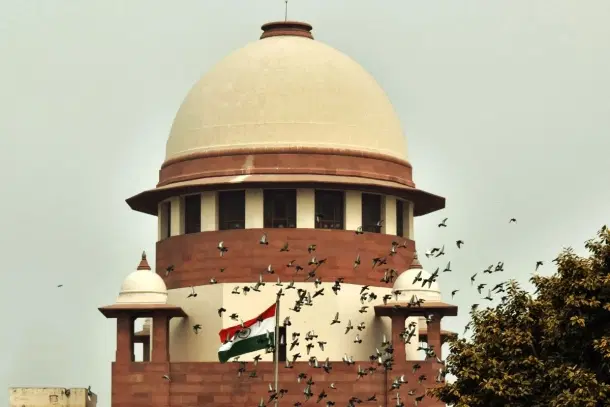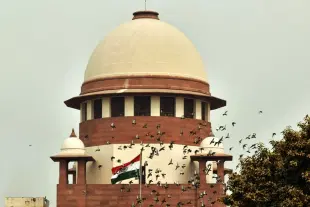News Brief
Systematic Discrimination: Supreme Court Flags J&K Constitution's 'Property Requirement' For Permanent Resident Status In The State
Bhuvan Krishna
Sep 05, 2023, 12:32 PM | Updated 12:31 PM IST
Save & read from anywhere!
Bookmark stories for easy access on any device or the Swarajya app.


The Supreme Court on Monday raised questions about the requirements set forth in the Constitution of Jammu and Kashmir for obtaining permanent resident status.
Justice Sanjeev Khanna, a member of the five-judge Constitution bench handling petitions challenging amendments to article 370, found the condition of property ownership as a prerequisite for acquiring this status to be peculiar.
He expressed his surprise at the notion that one must own property to obtain permanent resident status.
During the hearing, senior advocate Guru Krishnakumar drew attention to the predicament faced by numerous Hindu and Sikh families who were forced to flee Pakistan-occupied J&K.
These families have been unable to return to their ancestral homes and have been denied the same benefits given to similarly displaced individuals in the former state.
According to Krishnakumar, the discrimination faced by certain Indian citizens results from Section 6 of the J&K Constitution and Article 35A of the Indian Constitution as they apply to Jammu & Kashmir.
These provisions empower the administration to systematically discriminate against these citizens.
Krishnakumar also highlighted that his clients, who were forcefully displaced, lost their right to be permanent residents under Section 6, despite being state subjects as of 15 August 1947. Those who do not meet the definition of permanent resident under this provision must rely on the definition outlined in the 1927 order issued by the then ruler of J&K.
Justice Khanna raised a concern about the difficulty of obtaining documents from 1927.
During the proceedings, senior advocate Mahesh Jethmalani, representing the Gujjar Bakarwal community, informed the bench led by Chief Justice of India D Y Chandrachud that a thorough comparison of relevant provisions in the Constitutions of India and J&K "unequivocally establishes" that the "Union of India is sovereign qua...J&K".
Jethmalani stated that while article 370 divides legal sovereignty between the Union of India and J&K, ultimate legislative sovereignty resides with the former.
It was also pointed out that the J&K Constitution recognises the ultimate legislative sovereignty of the Union of India in Article 5. The most significant acknowledgment of this sovereignty can be found in Section 147 of the J&K Constitution.
Jethamalani submitted, “The second proviso to that section prescribes that no Bill or amendment seeking to make change shall be introduced or moved in either house of the legislature in three areas:
(i) Section 147 itself, which deals with amendments to the Constitution of Jammu and Kashmir;
(ii) the provisions of Sections 3 and 5 which…vests political sovereignty and ultimate legal sovereignty in the Union of India respectively; and
(iii) the provisions of the Constitution of India as applicable to the State of Jammu and Kashmir between the Union of India and the State of Jammu and Kashmir”.
He further argued that the Constituent Assembly mentioned in Article 370(2) and the proviso to Article 370(3) are synonymous, both in substance and procedure. Therefore, in the absence of a Constituent Assembly, the Legislative Assembly of the State of J&K should be considered as a substitute for the Constituent Assembly in the proviso to Article 370(3).
Senior advocate Kapil Sibal expressed his disappointment with a counsel in his rejoinder submissions. He said, “I am somewhat pained when a counsel argued that we respect the sentiments of people of J&K but you must also respect our sentiments”.
Sibal found this statement to be divisive, as it suggests that respecting one set of sentiments means disregarding another. He emphasised that the case should not be interpreted solely based on emotional or majority sentiment, but rather on a constitutional framework that upholds the principles of India.
Sibal argued that “They say Parliament has plenary powers under the Constitution. It’s actually the contrary. The power of Parliament to make laws is limited by Article 370… It stares you in the face, and you are talking about plenary power!”
In Sibal's view, the responsibility of deciding lies with the council of ministers rather than Parliament.
He stated that this approach allows for a gradual integration of J&K into India, facilitating effective communication and coordination among the executive bodies. This process ensures a smooth transition while considering the unique circumstances of J&K.
Bhuvan Krishna is Staff Writer at Swarajya.





